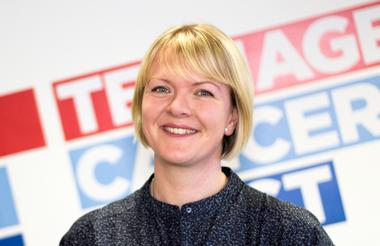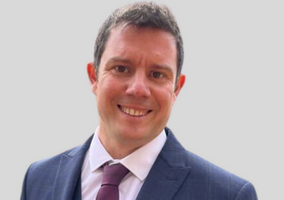Kate Collins became CEO of Teenage Cancer Trust in 2018 but was not entirely impressed with the interview process.
She told the charity that not having a young person involved in the recruitment for her role was a “missed opportunity” for the organisation.
“If we’re going to bring someone in who is going to make recommendations about decisions and the direction the organisation takes, young people should be part of that,” she says.
Afterward, Collins was motivated to create a way to engage with people with lived experience that “wasn’t tokenistic”.
She posed the question: “What do we need to do to become more grounded in the lived experience, realities, and views of young people who’ve gone through cancer?”
The outcome was the charity’s youth advisory group, which is made up of 30 young people diagnosed with cancer aged 13-24 who have experience of the charity’s services.
“We wanted a wider, more diverse range of views that could inform more decisions of the organisation, sometimes more operational decisions as well as strategic decisions.”
The board of trustees “love being challenged” by the advisory group, and there has been no resistance to their inclusion in the charity’s processes, Collins says.
“I feel very fortunate that the mindset and values are clear enough across the organisation that it’s not difficult to find out how we involve young people in this.
“Even things like shifting the language of the organisation from it not being ‘our young people’. They’re not ours. We’re really lucky if we get to be theirs.
“If we get to be one of the organisations that they value because we were helpful for them as they went through their cancer experience, that’s the win.”
‘If a charity is nervous about working with people with lived experience, that’s a problem’
Asked how Collins would advise other charities, she says: “If you’re worried that working with people with lived experience is going to change your established ways of working – you probably need to change your ways of working.
“I would say, if you’re worried that it's going to change the status quo, then you've got a problem, because the status quo is the problem.
“When you really tune in to the people with lived experience, all the answers for what your organisation needs to do are there. You just need to listen to turn it into action.”
Fundraiser to CEO
Collins started her career in the charity sector as a marketing manager for BBC Children in Need, which she says was seen as “the uncool one compared to Comic Relief”.
The role involved corporate, high-community and relationship fundraising, the latter being her favourite.
“I think what motivated me to become a fundraiser was that I am somebody who really likes getting things done. So, I really like quite a quick feedback loop on what I do and what it results in. I like making change happen.”
Collins was put in charge of BBC Children in Need fundraising packs which went out to everyone interested in supporting the charity.
“I think I fell in love with community fundraising, then. Even corporate fundraising, for me, is about mobilising communities about something they care about.”
Collins became head of regional corporate fundraising in 2002 at Cancer Research UK and became head of corporate fundraising three years later.
She went on to be head of fundraising and marketing at Penny Brohn Cancer Care in 2008 before joining the Teenage Cancer Trust the next year, where she has held various senior roles.
Collins believes her fundraising background taught her the importance of donor motivation.
“I think it taught me about how important it is to understand what is motivating people and how the organisation translates that into action and gets out of the way.”
‘Charities risk not applying what they learned through Covid’
One of the largest challenges facing charities is that they risk not applying the lessons they learned from the Covid-19 pandemic, Collins says.
“I think lots of what I and other charity leaders learned through Covid was no one organisation can do everything. You have to focus really carefully and closely on your purpose.
“When you’re trying to make systemic change to improve people’s lives, you have to work together in collaboration and also get out of each other’s way.
“We need to keep playing to strengths rather than competing. I think that’s where change really will come from.
“I think the risk is that some of those learnings from the acute pandemic time of 2020 get eroded over time and there’s quite a big gravitational pull to ask, but when do we get back to normal? And I know there’s lots of talk about the new normal, but I think actually we’re just in a new reality, which is focused on purpose and being really smart about playing to other organisations’ strengths and it is not a competition.”
Collins chairs the Children and Young People’s Charity Coalition – a group of over 40 charities for young people with cancer.
The coalition was created to help support smaller organisations, ensure no work is getting duplicated, and often lobby the government or the NHS with one united voice.
Teenage Cancer Trust also works closely with charities Ellen MacArthur Cancer Trust and Young Lives vs Cancer, Collins says.
“[Beneficiaries] shouldn't feel like they’re cheating on one organisation by getting support from another,” Collins says, explaining that the trust wants to make referrals to other charities a seamless experience for the people they support.
“That's how we get to make a bigger difference.”
Fundraising challenge
The cost-of-living crisis is another challenge facing the charity, Collins says, the full extent of which has not yet been felt. Having worked in the charity sector during the 2008 economic crisis, Collins says the current situation is “similar, but different.”
“It’s not just impacting young people with cancer. It’s not just impacting our supporters. It’s impacting my team. It’s impacting people’s worries about what’s going to happen to their rent when their landlord’s mortgage goes up or what’s going to happen to their mortgage if they have one. What’s going to happen to the price of travelling for work to get on a train? All of those things are very, very real challenges for everybody. And I think they will last for longer.
“This is a big change for the sector. And I think this is different to any other recession or economic challenge that certainly I've fundraised through. It's playing out differently and my sense is this is a big adjustment across the economy and all of us will need to change our business models to adapt to it.”
Teenage Cancer Trust has already seen a downturn in its fundraising due to the cost-of-living crisis, particularly in relation to mass participation events.
“We’re getting really great numbers of signups for those, so the volume of people who are motivated to support is higher than it was and higher in some events than it's ever been,” she says.
“But actually, the amount they are able to raise per head is starting to drop away.”
‘Government should see civil society as its partner’
Civil society should be seen as a partner to government to help improve society, Collins says.
“The thing that would make the biggest difference would be the charity sector being seen as a partner in improving society, rather than something that’s further down the thought process.
“Because the charity sector, particularly grassroots organisations, are fundamentally born out of and connected to what the most challenged bits of society need the most. If we flip the model and start there, I think that’s where there’s real potential for change.”
Collins says such a “mindset shift” would be beneficial to both civil society and government.
“The social sector of the nation is where the answers are. Lots of the answers to lots of the problems are there.”












